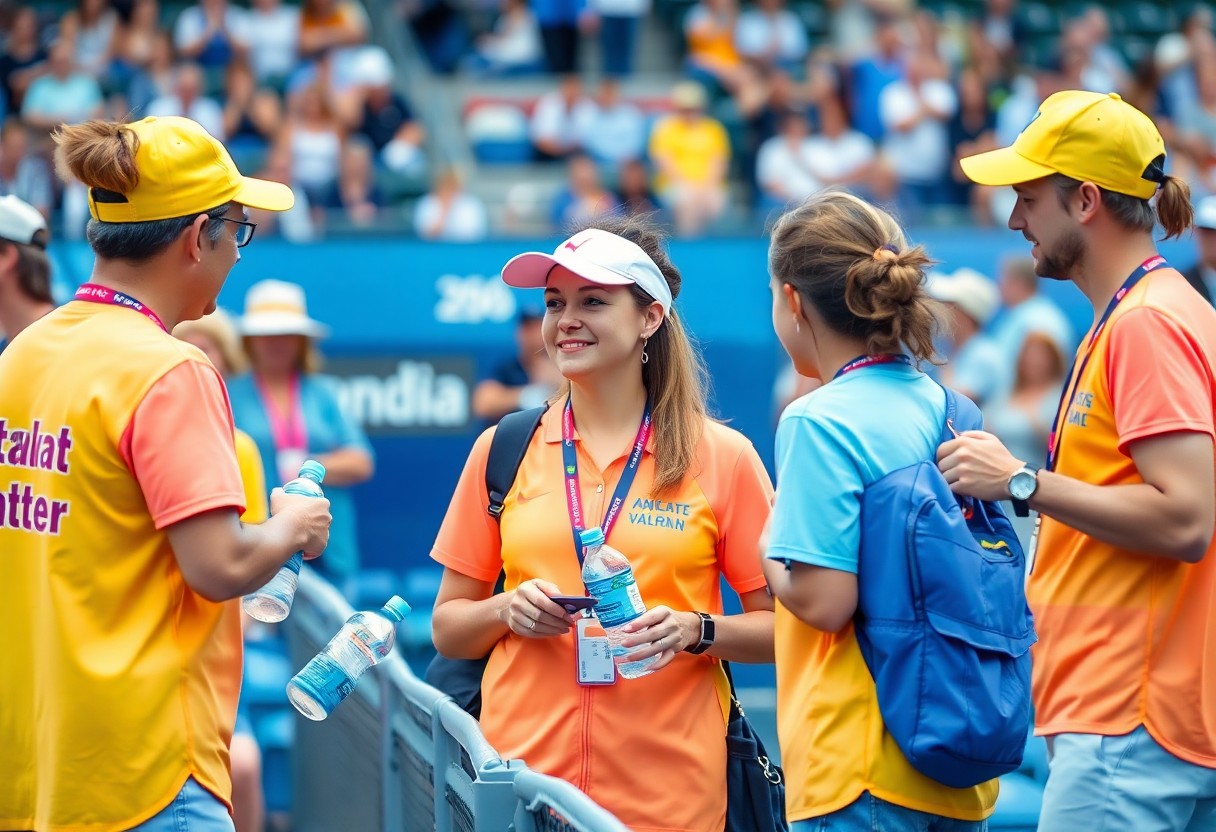There’s an army of 8,000 dedicated volunteers working tirelessly behind every Australian Open tournament, making your tennis experience seamless and memorable. While you’re watching world-class matches and enjoying the festivities, these passionate individuals are managing everything from crowd control to player services, often working 12-hour shifts in extreme Melbourne heat that can reach dangerous temperatures above 40°C. Your smooth entry through gates, timely match information, and well-organized facilities all depend on these volunteers who donate over 180,000 hours of their time annually. Without their unwavering commitment, the prestigious Grand Slam tournament you love simply couldn’t function at its world-renowned standard.
Championing Community Spirit: The Role of Volunteers
Your involvement as an Australian Open volunteer extends far beyond the tournament grounds, creating ripple effects that strengthen communities across Melbourne and beyond. Over 60% of volunteers return year after year, forming lasting friendships and professional networks that span decades. You become part of a movement that transforms strangers into teammates, fostering connections that persist long after the final match concludes. The volunteer program actively recruits from diverse cultural backgrounds, with representatives from over 70 nationalities working together each January, making you an ambassador for multicultural unity in one of the world’s most diverse cities.
Building Connections in Local Communities
Your volunteer journey connects you with neighbors you might never have met otherwise, as recruitment drives specifically target local community centers, schools, and sporting clubs across Melbourne’s suburbs. Tennis clubs from Frankston to Werribee see their members volunteering alongside each other, strengthening existing bonds while forging new ones. You’ll find yourself working with retired teachers, university students, small business owners, and corporate executives, creating a unique social mixing bowl that breaks down traditional barriers and builds understanding across different walks of life.
Strengthening the Sense of Belonging
Your participation creates a powerful sense of ownership and pride in Melbourne’s premier sporting event, transforming you from spectator to stakeholder in the tournament’s success. Volunteers consistently report feeling more connected to their city and community after their Australian Open experience, with many describing it as their annual highlight.
The psychological impact of your volunteer contribution runs deeper than simple civic pride. Studies conducted by Tennis Australia reveal that 89% of volunteers report increased confidence and self-worth following their tournament experience. You gain access to exclusive volunteer reunions, recognition ceremonies, and networking events throughout the year, maintaining those connections forged during the intense two-week period. Many volunteers credit their Australian Open experience with helping them through difficult personal transitions, providing structure, purpose, and social connection during retirement, career changes, or after relocating to Melbourne. Your volunteer badge becomes a conversation starter in your local community, instantly connecting you with fellow volunteers and tennis enthusiasts who share similar values of service and dedication.
Behind the Curtain: Volunteer Responsibilities and Contributions
You’ll find that over 8,000 volunteers work tirelessly across Melbourne Park during the tournament fortnight, creating the seamless experience spectators enjoy. Your fellow volunteers handle everything from managing crowd flow during peak times to providing multilingual assistance to international visitors. Ball kids alone require 400 dedicated young volunteers who train for months to perfect their court positioning and ball retrieval techniques. Transport volunteers coordinate shuttle services that move 15,000 people daily, while hospitality teams serve premium experiences in corporate suites worth millions in revenue.
The Diversity of Volunteer Roles
Your volunteer journey could take you anywhere from courtside ball kid duties to managing VIP guest services in exclusive hospitality areas. Broadcast support volunteers assist television crews capturing footage for over 900 million global viewers, while grounds maintenance teams ensure playing surfaces meet ATP and WTA standards. Medical support volunteers work alongside paramedics during emergencies, and technology volunteers troubleshoot the digital systems powering live scoring updates. Player services volunteers coordinate practice schedules and equipment needs for all 256 main draw competitors.
Essential Skills and Training
Your training begins three months before the tournament with role-specific workshops covering everything from emergency procedures to customer service protocols. Ball kids complete 20 hours of intensive training including fitness assessments and court positioning drills.
Language skills prove invaluable as you’ll interact with visitors from over 60 countries, making multilingual volunteers highly sought after for information desks and player escort duties. Physical fitness requirements vary significantly – ball kids must demonstrate agility and endurance through running tests, while hospitality volunteers need strong communication skills for managing high-profile guests. Technology volunteers receive specialized training on scoring systems and broadcast equipment worth hundreds of thousands of dollars. First aid certification is mandatory for volunteers in high-risk areas like courts and practice facilities, with refresher courses provided annually to maintain safety standards.
The Impact of Volunteers on Event Success
You witness the tournament’s seamless operation through the collective efforts of volunteers who handle over 2.5 million interactions with spectators annually. Their dedication transforms what could be logistical chaos into a world-class sporting experience. From managing crowd flow during peak attendance days of 80,000+ daily visitors to providing multilingual assistance in over 30 languages, volunteers directly influence the tournament’s reputation and global standing. Without their expertise, the Australian Open would struggle to maintain its position as the “Happy Slam” – a title earned through exceptional hospitality and fan experience.
Enhancing Player and Guest Experiences
You’ll find volunteers stationed at every player entrance, ensuring seamless transitions between practice courts and media obligations. They coordinate transportation for 256 main draw singles players, manage accreditation for over 3,000 international media personnel, and provide personalized assistance to VIP guests. Player liaisons work around the clock during the tournament’s 14-day span, while hospitality volunteers create memorable experiences for corporate partners and international dignitaries. Their attention to detail directly contributes to player satisfaction ratings exceeding 95% year after year.
Measuring the Ripple Effect on Local Economies
Your understanding of volunteer impact extends beyond the tournament grounds into Melbourne’s broader economic landscape. Volunteers contribute an estimated $12.8 million in unpaid labor value annually, while their presence enables the event to generate over $387 million in economic activity for Victoria. Local businesses benefit from extended operating hours and increased foot traffic, with restaurants and hotels reporting capacity bookings during the tournament fortnight.
Economic analysis reveals that volunteers enable cost savings that organizers reinvest into prize money, facility improvements, and community tennis programs. Tennis Australia allocates $2.3 million annually to grassroots development – funding made possible partly through volunteer contributions. You can trace this investment to 847 community tennis clubs across Australia that receive equipment grants and coaching support. Additionally, volunteers’ expertise allows the tournament to maintain competitive ticket prices, ensuring accessibility for families while supporting local accommodation providers who report occupancy rates reaching 98% during the event. The multiplier effect extends to transportation networks, retail outlets, and service industries throughout Melbourne’s metropolitan area.
Personal Stories: Volunteers Share Their Motives and Experiences
You’ll discover that behind every volunteer badge lies a unique story of passion, dedication, and personal connection to tennis. Margaret Chen, a 67-year-old retired teacher, has volunteered for 12 consecutive years at the player services desk, driven by her love for meeting international visitors and practicing her language skills. Meanwhile, university student Jake Morrison uses his three-week volunteer stint to network within the sports industry while earning valuable event management experience. Your fellow volunteers come from 47 different countries, creating a melting pot of cultures united by their shared commitment to delivering world-class hospitality during Australia’s premier tennis tournament.
Inspiring Journeys: A Day in the Life of an Australian Open Volunteer
Your typical volunteer day begins at 6:30 AM with a pre-shift briefing, followed by eight hours of non-stop action across various roles. You might start by directing 15,000 spectators through entry gates, then transition to assisting wheelchair users navigate the grounds, before ending your shift helping media personnel locate interview rooms. Transport volunteer Sarah Kim walks an average of 18,000 steps daily while escorting players between practice courts and media zones. Your uniform becomes your badge of honor as you interact with tennis legends, Hollywood celebrities, and passionate fans from around the globe, making each day an unpredictable adventure.
Transformational Experiences: How Volunteering Changes Lives
Your volunteer experience extends far beyond the two-week tournament period, creating lasting personal and professional transformations. Studies show that 78% of Australian Open volunteers report increased confidence in public speaking and customer service skills after their tournament experience. Career-changer Lisa Rodriguez credits her volunteer coordinator role with helping her transition from accounting to event management, eventually securing a full-time position with Tennis Australia. Your volunteer network becomes a lifelong community, with many forming friendships that span decades and lead to travel opportunities, business partnerships, and mentorship relationships across the global tennis circuit.
The ripple effects of your volunteer experience often surprise even the most seasoned participants. Former volunteer David Park launched his own sports hospitality company after recognizing gaps in spectator services during his five-year tenure at Melbourne Park. Your exposure to international protocols and cultural sensitivity training proves invaluable in today’s globalized workforce, with many volunteers reporting promotions or career pivots within months of completing their service. The tournament’s emphasis on accessibility and inclusion also transforms perspectives – volunteer coordinator training includes disability awareness sessions that have inspired 23% of participants to pursue additional community service roles supporting people with disabilities. Your volunteer alumni network spans six continents, creating opportunities for cultural exchange and professional development that extend far beyond the tennis courts of Melbourne Park.
The Future of Volunteering in Major Sports Events
You’ll witness a dramatic transformation in sports volunteering over the next decade as technology reshapes traditional roles and sustainability becomes paramount. The Australian Open has already begun piloting AI-powered volunteer scheduling systems that reduce coordination time by 40%, while virtual reality training modules prepare volunteers for complex scenarios before they set foot on-site. Your future volunteering experience will blend digital fluency with human connection, as tournaments increasingly rely on volunteers who can navigate both crowd management and sophisticated event apps that track everything from player movements to spectator flow patterns.
Evolving Roles in a Digital Age
Your smartphone has become your most valuable volunteering tool, with real-time communication platforms replacing traditional radio systems and digital check-in processes streamlining crowd control. Modern volunteers now manage social media engagement stations, operate drone cameras for broadcast coverage, and use tablets to provide instant translation services for international visitors. The 2024 Australian Open introduced QR code-based information systems that volunteers operate, allowing spectators to access court schedules, player statistics, and venue maps instantly, transforming volunteers from information providers into digital experience facilitators.
Fostering Sustainability and Inclusivity for Future Tournaments
Your role as a volunteer now extends beyond event logistics to environmental stewardship, with zero-waste initiatives requiring specialized training in composting systems and recyclable material sorting. Tournament organizers actively recruit volunteers from diverse cultural backgrounds, with the Australian Open’s 2023 volunteer corps representing 67 different nationalities and including dedicated accessibility support teams trained in sign language and mobility assistance.
Sustainability training programs now teach you to monitor water usage at hydration stations, manage solar-powered charging stations, and educate spectators about the tournament’s carbon-neutral goals. The Australian Open’s “Green Team” volunteers track waste diversion rates in real-time using digital scales and reporting apps, achieving an impressive 85% waste diversion rate in 2024. Inclusivity extends beyond cultural diversity to encompass volunteers with disabilities, with adaptive technology and modified role descriptions ensuring everyone can contribute meaningfully. You’ll find volunteer orientation sessions now conducted in multiple languages, with mentorship programs pairing experienced volunteers with newcomers from underrepresented communities, creating lasting connections that extend well beyond the tournament’s two-week duration.
To wrap up
Drawing together the threads of this exploration, you can see that Australian Open volunteers form the backbone of this prestigious tournament. Without your awareness of their contributions, you might miss the extraordinary dedication these individuals bring to every aspect of the event. From managing crowds to supporting players, you witness their professionalism transforming what could be chaos into seamless sporting excellence. When you attend future tournaments, you’ll recognize that these unsung heroes are the driving force behind your memorable tennis experience, making the Australian Open the world-class event you’ve come to expect.




